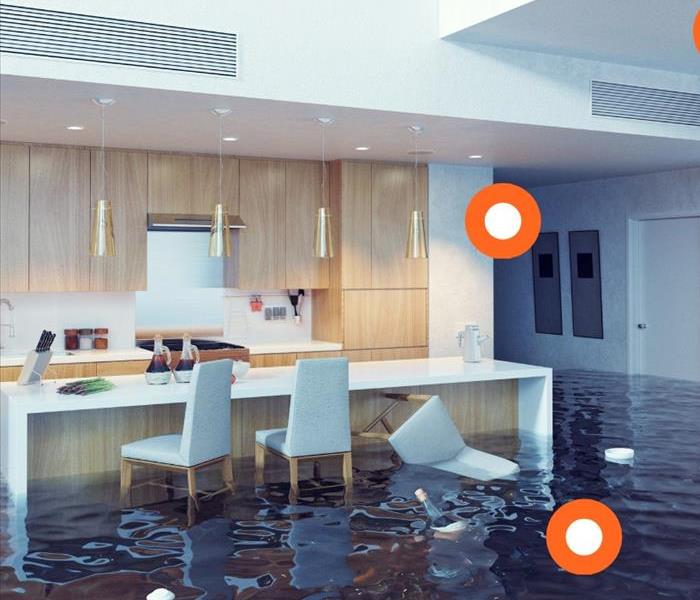Floodwater Dangers: Understanding the Risk of Electrocution and Other Hazards
10/17/2024 (Permalink)
 Safety always comes first—don’t take unnecessary risks in flood situations. If you need assistance contact us today!
Safety always comes first—don’t take unnecessary risks in flood situations. If you need assistance contact us today!
When flooding occurs, the immediate instinct is often to focus on the rising water levels and potential property damage. However, one of the most critical and life-threatening dangers often goes unnoticed—electrocution. Floodwater can carry a range of hidden dangers, and understanding these risks could save your life.
Why Is Floodwater So Dangerous?
Floodwater isn’t just water; it’s a powerful force that often brings a mix of hazardous materials and contaminants. It can carry everything from raw sewage and chemicals to sharp debris and, critically, the risk of electrical hazards. Power lines, electrical appliances, and submerged outlets can all pose severe risks when exposed to floodwater. Even a small amount of water in the wrong place can turn deadly when it comes into contact with electricity.
While most of us are aware of the physical dangers posed by floodwater—such as strong currents or deep water—the risk of electrocution is less obvious but just as severe. Taking appropriate precautions can be the difference between safety and tragedy.
The Risk of Electrocution in Floodwater
One of the greatest hidden dangers in floodwater is electrocution. Water is an excellent conductor of electricity, and when floodwater comes into contact with live electrical sources, it can become electrified. Electrical currents can travel through water, affecting anyone who comes into contact with it, even if the electrical source is not visible.
Here are some common ways floodwater becomes electrified:
- Downed power lines: Floods can knock over power lines, causing them to electrify large areas of water.
- Submerged electrical appliances: If a home or business is flooded, electrical appliances, outlets, and wiring can pose risks even if the power is out.
- Hidden electrical currents: Even if you cannot see the source, an electrical current can still travel through water, making it dangerous to step into any standing water.
Essential Safety Tips When Dealing with Floodwater
If you find yourself in an area affected by flooding, it’s vital to take every possible precaution to stay safe. Here are a few crucial tips to keep in mind:
1. Avoid Touching Electrical Equipment
Never touch electrical equipment, appliances, or power sources if you are wet or standing in water. The combination of water and electricity can be fatal. Even if you’re in a rush to salvage belongings or turn off the power, it’s not worth the risk if water is present. It’s best to wait until a professional can assess the situation.
2. Be Cautious of Hidden Objects
Floodwater is often murky, making it impossible to see what’s lurking beneath the surface. Unseen objects, such as sharp debris, glass, or even animals, can cause serious injuries if you aren’t careful. If you must wade through floodwater, wear appropriate protective clothing and be cautious of every step.
3. Avoid Using Open Flames
While it may seem like a good idea to use candles or other open flames for light during a flood-related power outage, this can be extremely dangerous. Flooding often causes gas leaks, which can create a highly explosive environment. Using open flames in areas where gas may be leaking can ignite a fire or cause an explosion. Instead, use battery-powered lights or flashlights for illumination.
Additional Precautions to Consider
Beyond the immediate dangers of electrocution and injury, there are other precautions to keep in mind when dealing with floodwater:
- Turn off the power if possible: If you know your home is at risk of flooding and you have the chance, turn off the main electrical power supply before the water reaches electrical systems. This reduces the risk of electrocution.
- Stay informed: Monitor news reports and local authorities for updates on the status of power lines, electrical hazards, or gas leaks in flooded areas. Information can change rapidly during a flood event, so staying updated can help you avoid danger zones.
- Seek professional help: Once floodwater subsides, it’s tempting to re-enter your home or business to assess the damage. However, it’s important to have a professional—such as an electrician or emergency services personnel—evaluate the property for electrical hazards before entering.
Long-Term Consequences of Flood Damage
Even after floodwater recedes, the damage it causes can linger for months or even years. Electrical systems, wiring, and appliances that have been submerged in water are often compromised and may no longer be safe to use. Mold and other contaminants can also form, creating additional health risks.
Once your property is deemed safe, you’ll likely need to replace or repair many electrical components. Never attempt to restore electrical power without a thorough inspection from a licensed electrician.
Floodwater is dangerous for many reasons, but the risk of electrocution is perhaps the most critical hazard to be aware of. Water and electricity don’t mix, and the consequences of coming into contact with electrified water can be deadly. Always prioritize safety by avoiding electrical equipment when wet or standing in water, steering clear of unseen hazards, and never using open flames during a flood event.
By staying informed and taking the right precautions, you can minimize your risk and protect yourself and your loved ones from floodwater's many hazards. Safety always comes first—don’t take unnecessary risks in flood situations. If you need assistance contact us today!





 24/7 Emergency Service
24/7 Emergency Service